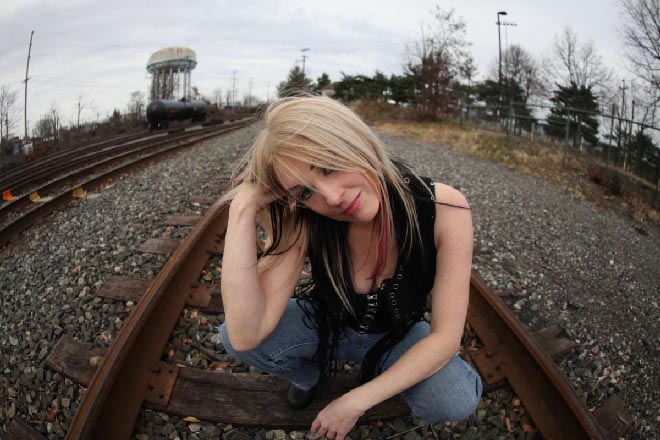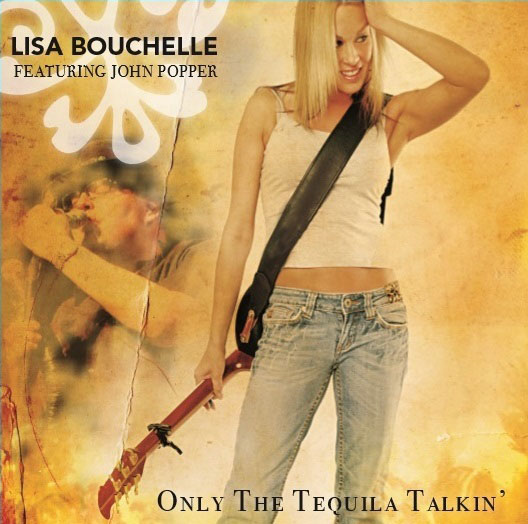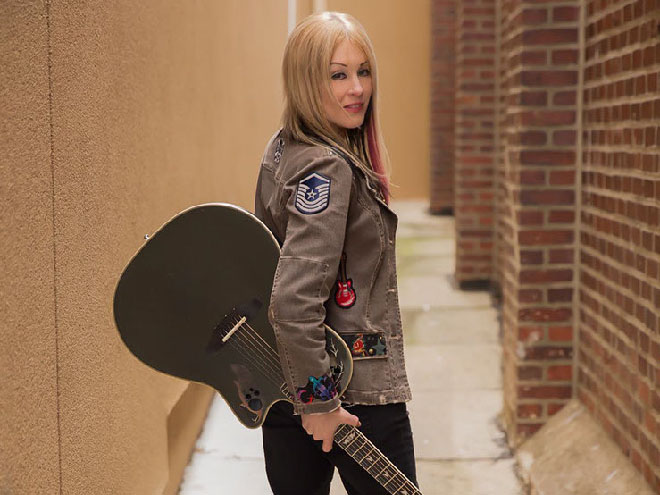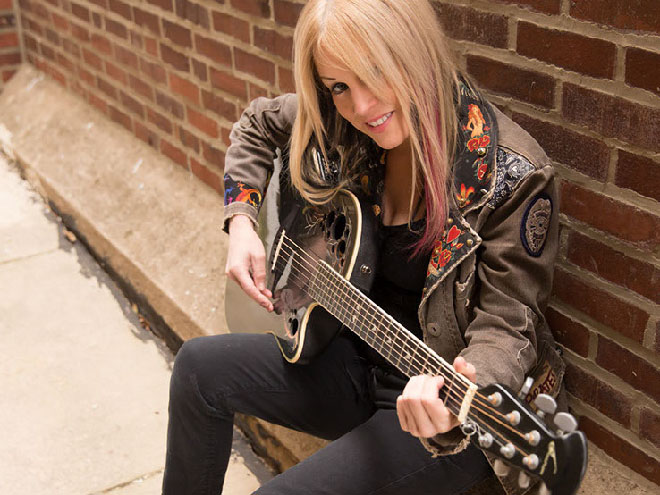VIDEO PREMIERE
Musician: LISA BOUCHELLE – with JOHN POPPER
Music Video: “Only the Tequila Talkin’”
INDIE AMERICANA SINGER LISA BOUCHELLE FEATURES BLUES TRAVELER’S JOHN POPPER ON THE SINGLE “ONLY THE TEQUILA TALKIN’”—WITH 500,000 PLAYS ON SPOTIFY
LISA BOUCHELLE (with JOHN POPPER) Web-Exclusive Interview
with M Music & Musicians magazine publisher, Merlin David

LISA BOUCHELLE
How did the EP Lipstick Tomboy evolve?
We put this collection of songs together as a bundle that was digitally downloadable through Amazon, iTunes. We picked four songs to provide variety. The song “Only the Tequila Talkin’” was a duet with John Popper from Blues Traveler. It’s a song I wrote with John Eddie. We asked John (Popper), and he seemed really into it. It’s a fun song, a drinking song. I went out to Seattle to record it. We have a remake Gordon Lightfoot’s “If You Could Read My Mind”—one of my favorite songs. “Heart versus Mind” is a song I wrote with Jeff Trott [Sheryl Crow, Stevie Nicks, Colbie Caillat]—out in LA. It’s a song I wrote about when your heart arguing with your mind. I thought about so many people I know. With Jeff Trott road testing the song, so many people were able to relate to that concept. Business or love, your mind tells you one thing, but your heart tells you something else. I felt like the EP needed the song. So much of my writing is introspective, and I wanted to do something fun. “Luv is Supposed 2B Fun” has a steel drum, and it’s a party kind of thing. Yes, love is complicated but just have fun with it. It’s a light song. We tracked the songs on the East Coast, and out in LA and Seattle.
Is there a full album coming soon?
Right now, it’s just the EP. We do have these songs and others featured on a Fan Club-only cd called A Whole Lot of Highway—10 songs. In the bridge of the title song, it references a mixed up Lipstick Tomboy hitting the scene—which refers to me. I thought it was a cool description. I’ve done so much touring—some is glamorous at times, but the first tour I did was in my car—12,000 miles. I opened for Blues Traveler in 2007, and I drove it. Even though it was glamourous when I was on stage, I was driving and trying to fend for myself—living out of canned goods. That’s really the tomboy aspect of it.
How did the idea of “Only the Tequila Talkin’” come to you?
I wanted to write a song with John Eddie. I’d been opening for him locally, and working with him, and he said, ‘Yeah, let’s write something together.’ He’s out of Nashville, and he wrote “Lowlife” for Kid Rock. He was writing all these clever hooks. It just came to me, ‘It was only the tequila talkin’, shoulda took it with a grain of salt.’ So I called John and said, ‘Listen to this hook—it sounds like something you would write.’ And he said, ‘I can’t believe I didn’t write it.’ We got together and wrote the song. He’s so poetic—such a good writer. He came up with the line in the second verse: ‘Coyote ugly on the SpectraVision in the not so Super 8.’ Since I couldn’t top that, I wrote: ‘He said the sex would be amazin’ but it really wasn’t that great.’ (Laughs)

LISA BOUCHELLE
When did you write “Tequila?”
Just before the first record. The first version didn’t have enough harmony or interaction. We needed to remix it with a fun beat and maybe some handclaps. The song got a lot of attention when I was playing it live. We felt the time was right because it’s a chick singing a drinking song, and it’s a fun song. A song like this, now, is rare. In the old days, with Kitty Wells, it might have happened, but not now in modern country. But we did it, and it’s doing so well on Spotify. We’re so happy people are digging the song. And the video is an old time western scene, like Bonanza—it’s really fun.
What did John Popper bring to this song?
He’s got that attitude. You can give him a line to sing, and he makes it his own. With his voice—he’s so real about it. He brings his own perspective to everything he sings. And the harmonica playing—is like no one else. He brings so much life, especially to a fun song like this one. We knew each other from the tour. They took me under their wing. They would have me up on stage every night, and we’d be singing songs like “The Joker,” and people would say ‘you both have such good chemistry together on stage.’ That helps the song sound real and authentic. The video represents how we perform live, and how much fun we have. He’s from that jam band world, and they are all about living in the moment on these live shows. He and I have so much fun performing it live. We had a good time recording it in Seattle. The Blues Traveler drummer, Brendan Hill, played on the track. I’m hoping we can perform it this year at some bigger venues.

LISA BOUCHELLE
Who inspired you to write songs?
A lot of musicians inspired me, but also my mother who wrote poetry, and my father—who was a singer. I just got that bug. I took lots of vocal lessons, but before that I learned to sing from my Dad when I was a little tyke. I loved to sing, and with my mother I was exposed to poetry books, and music like Crosby Stills & Nash, Neil Young, Joan Baez, Bob Dylan, Simon & Garfunkel—all these poetic writers. They created images in my mind just by hearing their stories. The influence of that music is still so prevalent in my writing. My fans appreciate it. (Laughs)
You sang back-up for a lot of people.
I’ve opened and toured with Meatloaf, Ted Nugent, Blues Traveler, America. I sang back-up for Jon Bon Jovi, Bruce Springsteen, Cyndi Lauper and others. It’s been the most valuable education.
Tell us about a time you recorded or played live on stage with a musical hero.
When I was a kid, I sang along with the radio. My Mom would play Bon Jovi stuff, and I would sing along to it. I used to think, ‘You know, our voices really blend—and we should do a duet sometime.’ I thought, ‘When I meet him, I’ll tell him.’ What kid doesn’t think stuff like that? We were up at a concert in Sayreville NJ, where Jon was performing for a huge philanthropic event—a charity his wife works with. Each of us was assigned a song, and when I got a chance to do my solo, he said, ‘Do you want to do a duet with me on Who Says You Can’t Go Home?’ That was such a big hit at the time, and when I was up there—I couldn’t believe I was actually singing with Jon Bon Jovi. (Laughs)

You said your Dad sang. Did he do anything with music?
He had stage fright, but he changed my entire life. I feel like I’m going to cry because both my parents passed away. He didn’t do a lot with his singing—in terms of performing live. But he truly changed my life. He was supposed to sing live with me just before he passed away. I was up in the Village in New York. We were doing a little bus trip. I was 17, and I convinced my Dad to sing “Bridge Over Troubled Waters.” His voice was gorgeous. (Sighs) He had heart issues in the past, and just a week before we were going to sing together, he passed away. But I know they are still looking down—and watching me.
What is your creative process for writing songs?
Songs come in different ways. But I get into a mode. I can push myself into that mode in this busy world. I can shut everything off and usually by the second song—it starts to flow. But sometimes it just takes over me, and that’s when I get the best results. If I’m lying in bed, and a thought comes to me—I get my guitar. If a song wakes you up, you need to take the time. (Laughs) Usually it’s a line of lyrics attached to a melody or at least a meter or some kind of rhythm. The guitar helps it flow, and I flesh out the song. If sad, I might go with minor chords. Or dreamy, open chords. It takes shape, and I usually finish it the third time around. I don’t nitpick a song. I feel songs are floating in the air, and most writers are just there—to channel the songs. As an artist, it comes through you. I was influenced by early musicians, like Neil Young.
I feel like they didn’t make things fit into a cookie cutter mold. If you search too hard for a lyric, you might lose the original intent. Sometimes it’s better to leave things alone.

Tell us one experience where something unique inspired you to write a song.
When I watched the movie The Curious Case of Benjamin Button, where he’s aging backwards. It’s not as well-known as some of my other songs on Bleu Room with a Red Vase. It has a string section by Lorenza Ponce from Bon Jovi’s band, and it’s real dreamy. The song is about meeting someone again, on the way back.
What songwriting tip would you like to offer?
Follow your instincts. All of us hear songs inspired by movies or different places, but it will flow through each artist in a unique way. Don’t try to use a template or put it into a specific format. Let it filter through you. Most artists who influenced me have been unique. If it sounds a little different—let it stay unique. Don’t overthink your instincts because each person has their own thing to offer. And that’s good.

What instrument/equipment can you not live without?
I like my Ovation guitar very much, and my writing is influenced by it. I write a lot on it, and I play it more because it has a thinner neck, and because of its action. It’s an acoustic-electric guitar, so it lends itself to songs like the theme song I wrote for my TV show, Rock Star Kitchen. I host that show. The song is all bar chords, and I never would have written it in C#m if it wasn’t for the neck of that guitar. My Ovation actually influences the songs I write. When I’m on tour, my Ovation never feeds back. Sitting on the sofa, it might not have the resonance, but when I’m an opening act—on stage—it never feeds back. So I can concentrate on my vocal sound, and relax. I just love my Ovation Guitar! (Laughs)
Any other guitar?
Sometimes I play an Alvarez, it’s a fuller body sound. When I’m playing songs by Johnny Cash or Kris Kristofferson, or a story song like “Where You Are” (for my Mom)—where you have a lot of bass notes or bass runs, it just has this full body, old time Nashville sound. It’s pretty cooperative on the feedback aspect, but it doesn’t have the buttery feeling like the neck of the Ovation. It has a beautiful resonance. I also love my Alvarez.
Any other equipment?
Shure microphones—I love my Shure Beta 87 cardioid, not the hyper cardioid. Oh, and my TC-Helicon harmonizer pedal that I use in my solo shows. When I step on that, it really brings out the choruses of my songs. I love my Danelectro bass—it sparkles, it’s silver, and I love the sound.

What PRO are you with, and how do they help a songwriter/artist like you?
ASCAP. They’ve always been on time—sending me checks, and they respond when I have any questions. It helps to keep all my songs logged in. They have a lot of resources. My manager, Hal, will know more. He’s always got stuff brewing. He’s a good manager.
Top 5 Musicians who inspired you to become a musician?
Stevie Nicks, the Beatles, and storytellers like Joan Baez—really inspired me. The way she could tell a story and the guitar chords behind it. One singer with a guitar, telling stories—painting pictures—I wanted to be that person who’s able to change the energy in a room—whether it’s an arena or a small room. They bring everyone together for a moment., and people forget about everything else. All these people, with different lives, are all together—with this one shared experience. One voice—one singer with a guitar controlling all that. It inspired me the most. There are old country artists like Waylon Jennings—the way you can hear the cry in his voice, his emotions. When I was a little kid, I’d wonder, ‘How will I do that?’ With the old country records, they were so genuine. People like Sheryl Crow—that LA fresh sound—that’s what I wanted to do. I wanted to use the older stuff to influence me, and bring this new sound that’s uniquely me. In time, you find yourself—your sound.
What are your Top 5 favorite albums of all time?
Disraeli Gears (1967) – Cream
The Fame Monster (2009) – Lady Gaga
Belladonna (1981) – Stevie Nicks
I’ve Always Been Crazy (1978) – Waylon Jennings
Rosebud Bullets (2007) – Myshkin’s Ruby Warblers

Best advice someone has given you regarding your music career.
My management team always says: the cream always rises to the top. Whenever I try to adjust my music by thinking ‘Maybe I should make it more pop,’ or when I get frustrated—that advise helps me stay on the straight and narrow. It helped me find my intimate, talking voice. Some call it the bedroom voice. Don’t bark the song at people, even if you have to take it down a step—make it more conversational, more intimate. When you’re in the car, and you’re listening to songs where you feel like the person on the radio is talking to you. It’s good advice for my Americana music. That was valuable to me, and I can hear it on the last couple of records.
Best advice you’d like to give upcoming musicians.
I’ve been on stage entertaining people since I was four years old. My parents would argue a lot, and when I would sing—everything would be happy. I went on stage as a little kid, at a campground talent show. I remember they put me on a picnic table because I was so much smaller than the other contestants. I sang “America the Beautiful.” My grandma made this red, white and blue outfit. Everyone started clapping, and I won the talent show. I remember thinking, I made everyone happy—this is what I want to do—something positive and powerful. And I never changed my mind. I’ve been singing so long. It’s never been an American Idol thing. No instant fame. It’s a job. I’m an entrepreneur. I moved up from doing local coffeehouses, to sending my records to a local writer who knew a management company, and I never ever stopped. I just moved forward. The TV show we got took a year and a half. Then we ended up being on a network where we got the highest ratings for original content—for Rock Star Kitchen. It’s been building one step after the next. I don’t feel like my career started only when my two albums got national distribution. I started when I was four.

Where were you when you first heard one of your songs on the Radio?
I just did a gig at the shore. I was driving home and I had to pull over because it freaked me out. I thought, ‘I don’t want to get into an accident here.’ I was on 195, headed west when (laughs) “Heaven on Credit” came on the radio.
What’s next?
We’re really focusing on the EP—with all the strength that “Tequila” is getting. I’m hoping something really tremendous happens. We’re planning a tour this summer—maybe an opening act where I’ll be out for a couple of months. I can’t wait for the traveling and the live performances. Of course, I’m always writing.
How often do you write?
Usually one week a month I get prolific. I always have ideas floating around, and I put them all together, and I usually write several songs a month. It’s usually a certain week. There is too much noise in the world. You have to find or make the time. I may write three songs at a time, and maybe one or two I keep. Sometimes, a song hits. Other times I road test them at one of my local shows—where I learn something different about the song.

LISA BOUCHELLE with JOHN POPPER
[We talked with John Popper:]
Tell us about working with Lisa on “Only the Tequila Talkin’.”
John Popper: The thing that I always think of, when I think of Lisa, is how hard she works. I saw her with her cooking show, as well as with this album, and really all of her albums. She starts with almost nothing, and makes something out of it by her sheer will. She’s very talented, but she also just has a vision, and makes it happen. With this record, she knew she had to get a record made, she enlisted the help of our drummer Brendan [Hill] for the track, he drummed on it, and recorded the part I was on. I came in, and it was just a fun track. The premise of it was really cool. But I knew it was going to be a great thing because of her determination. I don’t know if I know anybody who is as determined as she is.
How did you put your own spin into it?
John: I tried to think like I’m drunk. (Laughs) I go back to the song because I’m singing this character where she and I talk about a mediocre sexual experience, and we’re drunk in a hotel. The tequila did most of the work. I’ve had plenty of those. (Laughs) So you just remember, if it’ll let you. I guess, you let the tequila do the talkin’. (Laughs)

LISA BOUCHELLE with JOHN POPPER
Tell us about your harmonica playing.
John: I was a Hohner Special 20 man all my life, and then Fender approached me to make a John Popper model. So I have one of those. They worked with Seydel , a really great old German company. It’s a really awesome harmonica. Depending on the lightness I want, or how I want it to cut with the amps, I use both now. It really depends on the amp situation. The Fender one is much quieter, but the Hohner one isn’t as precise. It really depends on what mood you’re going for. It gives me another place to go. I was raised on Hohner, and for me it drives like a Porsche. It’s hard to beat a Hohner. But I was looking for a signature harp—and Fender made that happen. Shure microphones build a chassis for my mic rig, a plastic body, to hold all the wiring. It’s a very bizarre looking microphone, and it’s basically homemade—and it works great.
Tell us about Lisa’s work ethic.
John: I remember the cooking show—where we had it in some room. Looked like it was in some public building or school, and somehow she got the use of the room, and got the production company together. And again, I don’t know what she had for a budget, but she came up with something to make it work. And it was a good little cooking show. We made chicken paprikash, if I remember. I didn’t write this song, she wrote it with somebody else, but I got to sing it with her a whole bunch when she went on tour with me. It has a great back and forth camaraderie—and that’s written into the song. So it’s easy to just fall into that part. I love the attitude she sing with. I love the way she sings.
Where can your new fans get more info and stay updated?
LisaBouchelle.com

LISA BOUCHELLE with JOHN POPPER



comment closed